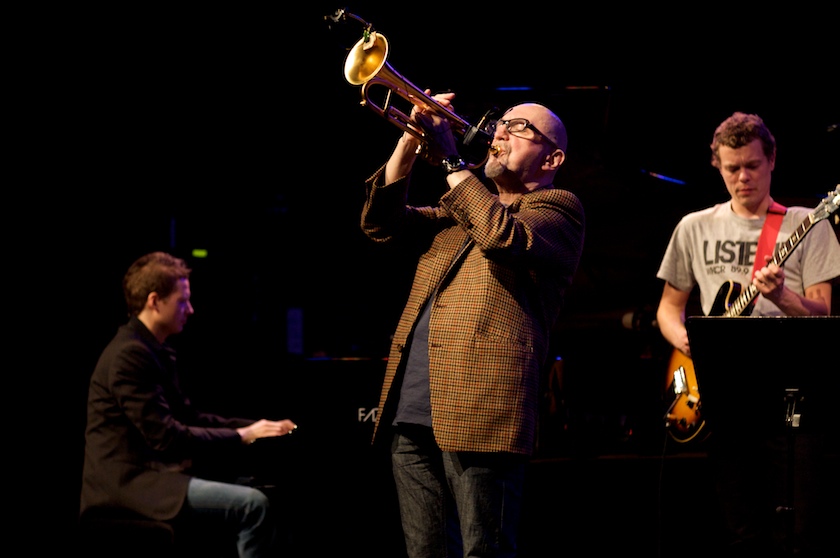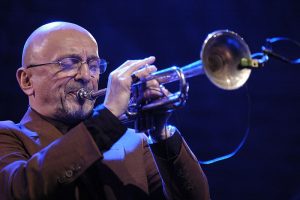Tomasz Stanko was 20 and a graduate of the Cracow Music Academy when he formed his first band, the Jazz Darings, with pianist Adam Makowicz in 1962.
Inspired by early Ornette Coleman and the innovations of Coltrane, Miles Davis and George Russell, the group is often cited by music historians as the first European group to play free jazz, but for the trumpeter its importance was eclipsed by the invitation to join Krzystof Komeda’s quintet the following year. Stanko has acknowledged that much of his subsequent musical direction and his own compositional style was influenced by Komeda. The lyricism, the feeling of playing only the essential, the approach to structure, to asymmetry, many harmonic details. Stanko toured for five years with Komeda, appeared on 11 albums with him, and also made contributions to all of the films scores that Komeda realized in Poland.
In 1970, Stanko joined Alex Schlippenbachi’s Globe Unity Orchestra, which brought him into contact with all the key figures of the European jazz avant-garde, and also formed a quintet, with violinist Zbiegniew Seifert. The following year he collaborated with Krysztof Penderecki and Don Cherry. His most important work of the 1970s, however, may have been with Finnish drummer Edward Vesala. Their series of quartet albums, of which Balladyna was the first, set some new directions with explorations of the free ballad, graced by soulful, grainy trumpet, and Stanko also made important contributions to Vesalai’s Together album, a massed gathering of Nordic/Baltic improvisers.
During the 1980s Stanko explored many approaches to improvisation. He travelled with Vesala to India and recorded trumpet solos in the Taj Mahal; again with Vesala, he hooked up with Chico Freeman and Howard Johnson in New York. He worked extensively with Cecil Taylor in large ensemble contexts, and led a number of groups of his own, such as COCX, which deployed post-Bitches Brew rock-rhythms, and Freelectronic, an ahead-of-its-time exploration of electro-acoustic options. Bluish, a trio recording with Arild Andersen and Jon Christensen preceded a return to ECM.
Since resuming his association with ECM with Matka Joanna in 1994 (his first album as a leader for the label in 20 years), Stanko has reached a new audience with his work. Two recordings with his international quartet with Bobo Stenson, Anders Jormin, and Tony Oxley, were followed by a highly successful tribute to film music composer and mentor Krzysztof Komeda in 1997. Stanko’s Litaniaproject became a popular fixture on the international festival circuit. In 1998, producer Manfred Eicher assembled a trans-idiomatic band around the trumpeter for From The Green Hill, a recording which pooled the talents of Dino Saluzzi, John Surman, Michelle Makarski, Anders Jormin and Jon Christensen. The Green Hill album won the coveted German Critics Prize (Deutscher Schallplattenpreis) as Album of the Year in 2000.
All of the above had been, as it were, events on the main stage. Concurrently, however, Stanko maintained a Polish quartet, which now became a priority for him. Pianist Marcin Wasilewski, bassist Slawomir Kurkiewicz and drummer Michal Miskiewicz were already working together as a (very) young trio when Stanko first heard them at the beginning of the 1990s, and in 1994 they began to work together, initially on theatre music, some of which was recorded for the Polish Govi label. They quickly developed into his band of choice for all Polish engagements, working with him on theatre and film music initially. Pianist, bassist and drummer have also built up a reputation as a unit in their own right, working under the name Simple Acoustic Trio. Soul of Things is the quartet’s first record release.
Soul of Things is essential Stanko, the trumpeter playing with that dark, intense tone that is so immediately identifiable. The programme on this occasion is a balladesque suite, brimming over with Slavic lyricism, and simply titled Soul of Things, Variation 1-13. The music makes allusion, in passing, to themes Stanko has contributed to Polish film, and other pieces of his, including the classic Maldoror’s War Songare also quoted, but as Stanko says, tongue only partly in cheek, “I’ve been playing the same song my whole life.” Titles, in other words, are after the fact; what matters is the emotional depth, and this has been a constant through the different phases and forms that Stanko’s music has taken over the years.
There is a “timeless” feel to Soul of Things that relates to Stanko’s roots as a player; this forward-looking trumpet player is also looking back here. His all-inclusive music on this occasion seems to connect with early influences. While sounding unmistakably like himself he also triggers memories of his first heroes.
In the years since Stanko’s much-loved Soul of Things, both the trumpeter and his young band had continued to make their mark. Many miles of touring, on both sides of the Atlantic, had honed their already exceptional group understanding. Suspended Night builds upon the conceptual framework established by its predecessor” the bulk of the album is devoted to a series of Suspended Night – but the improvisational quotient is expanded, as all participants take more solo space, and more chances.
Stanko’s music has changed dramatically in the last decade. He has managed to make his music more accessible without removing the grit and verve that has always been his trademark. And so it is with this his latest disc for ECM and the second with his regular working Polish band of Marcin Wasilewski, piano, Slawomir Kurkiewicz, bass and Michal Miskiewicz, drums. It’s a strong group characterized by Wasilewski’s ringing impressionistic style influenced by Bill Evans and even more than on Soul of Things, the group’s last outing together, Kurkiewicz’s carefully executed bass figure make his presence felt and anchor the strong melodies that Stanko provides. As before he does not give the tunes names and this is appropriate as the album has a consistency and unity that makes the individual songs feel part of a greater whole. Stanko may have mellowed but this album is a beauty.
Concurrently with Suspended Night, ECM issued an anthology of Stanko tracks as Volume XVII of its Rarum/Selected Recordings series, which provides a useful overview of the pre-Soul of Things years. In his liner note to the Rarum recording, Stanko talks of the unified nature of his compositions, from the beginning until now, and their range of expression: “From chaos to order, from fury to lyricism.” Lyricism has the upper hand in the pieces played by the Suspended Night ensemble, but the musicians understand the importance of creative tension, and Stanko’s darting phrasing always takes unexpected turns.
In 2004, the Stanko Quartet again spent most of the year on the road. Following a British tour in February, the group had a series of concerts in Germany, Austria and Switzerland in March and April. In May they toured Spain. In June they returned to the States (Stanko’s first-ever US tour in 2002 met with extremely positive reactions and sold-out shows). Italian concerts and festival appearances were scheduled for the summer, and in October/November the Quartet toured their Polish homeland.
In 2004 Stanko was honored by President of Poland with an Order of Polonia Restituta, ranked second amongst Polish civilian decorations. In the autumn 2004 Stanko appeared as a curator of two international jazz festivals in Poland: Signed by Stankoî in Warsaw and The Jazz Autumn in Bielsko Biala. Both festivals were enormously successful and entusiastically received by the audiences and trade media.
Spring 2005 brought the Tomasz Stanko Quartet to USA and Canada for its third North American tour. It started with four night at NYC’s legendary Birdland and continued through 12 major cities on both coasts and most prestigious venues such as Washington DC’s Blues Alley, Chicago’s Hothouse, Seattle’s Triple Door, LA’s Jazz Bakery, and Oakland’s Yoshi’s. All those houses were sold out, many of them had presented Stanko before and invited him to come and play again.







More Stories
CD review: George Benson – Dreams Do Come True: When George Benson Meets Robert Farnon – 2024: Video, CD cover
The band was tight as ever. The Warren Haynes Band cuts loose: Video, Photos
Interview with Alvin Queen: Feeling Good – I heard these tunes played by … Video, new CD cover, Photos